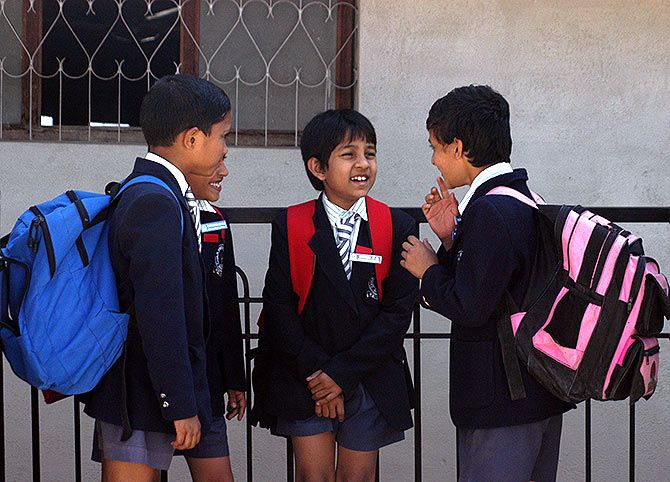Sitharaman said the government will bring in a new national education policy to transform India's higher education system into one of the best in the world.

Setting up of National Research Foundation (NRF), adoption of a New Education Policy and allocation of over Rs 400 crore for building world-class institutes are among the budgetary announcements made for the education sector on Friday.
Rs 94,853.64 crore outlay has been earmarked for the education sector in 2019-20 fiscal, an increase of over 13 per cent from the revised estimates of 2018-19.
In the last budget, then finance minister Arun Jaitley had allocated Rs 85,010 crore for the education sector which was later revised to Rs 83,625.86 crore.
Presenting the first Budget of the NDA government in its second term, Union Finance Minister Nirmala Sitharaman also announced 'Study in India' programme aimed at attracting foreign students to the country.
She said the government will bring in a new national education policy to transform India's higher education system into one of the best in the world.
The policy proposes major changes in both school and higher education, improved governance and focus on research and innovation, for which a National Research Foundation (NRF) would be set up to coordinate and promote research in the country, Sitharaman said.
"The NRF will ensure that the overall research ecosystem in the country is strengthened with focus on identified thrust areas relevant to our national priorities and towards basic science without duplication of effort and expenditure," the minister explained.
Sitharaman said funds available with all ministries will be integrated in the NRF and would be adequately supplemented with additional funds.
While Rs 38,317.01 crore has been allocated in the Budget for higher education, Rs 56,536.63 crore has been earmarked for school education.
Also, Rs 30,000 crore has made available for higher education institutes using the Higher Education Financing Agency (HEFA) funding mechanism, the HRD ministry said.
However, the outlay for the University Grants Commission saw a decline compared to last financial year.
A total of Rs 4,600.66 crore has been allocated for the UGC, as against the 2018-19 revised estimates of Rs 4,687.23 crore.
The initial outlay in the last fiscal was Rs 4,722.75 crore.
Union HRD Minister Ramesh Pokhriyal 'Nishank' thanked the finance minister for giving priority to education sector and overall development of students.
He also asserted that aspirations of all stakeholders in education sector would be met by this Budget.
"I am happy over the increased allocation of budget in the education sector. Creation of National Research Foundation would play a key role in coordinating the research efforts of all ministries," he told reporters.
Support to IITs, Rashtriya Uchhatar Shiksha Abhiyan (RUSA), Scheme for transformational and advanced research in Sciences (STARS), Scheme for Promotion of Academic and Research Collaboration(SPARC), Impactful Policy Research in Social Science (IMPRESS), are among the schemes which have got considerable allocations in the budget.
The other schemes which got substantial allocation include, implementation of the IMPRINT Research Initiative (Impacting Research Innovation and Technology), Study in India and National Mission in Education through information and communication technology.
The budgetary outlay for the Indian Institutes of Technology (IITs) is Rs 6,409.95 crore, for Indian Institutes of Management (IIMs) Rs 445.53 crore and and Rs 899.22 crore for the Indian Institutes of Science, Education and Research (IISERs).
Sitharaman said massive online open courses through SWAYAM initiative have helped bridge the digital divide for disadvantaged section of the student community.
The government initiative aims at taking the best teaching and learning resources to all, including the most disadvantaged by bridging the digital divide.
To upgrade the quality of teaching, the Global Initiative of Academic Networks (GIAN) programme in higher education was started, aimed at tapping the global pool of scientists and researchers, the finance minister said.
The IMPRINT or IMPacting Research INnovation and Technology scheme began as a pan-IIT and Indian Institute of Science joint initiative to develop a roadmap for research to solve major engineering and technology challenges in selected domains needed by the country, she said.
The minister said it is because of this that higher education institutions are now becoming the centres of innovation.
Photograph: Reuters











 © 2025
© 2025